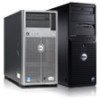Dell PowerEdge R420 Owner's Manual - Page 10
Indicator, Button, or, Front-Panel Features and Indicators-Eight 2.5 Inch Hard-Drive System - dvd
 |
View all Dell PowerEdge R420 manuals
Add to My Manuals
Save this manual to your list of manuals |
Page 10 highlights
Item Indicator, Button, or Icon Description Connector 5 LCD menu buttons Allows you to navigate the control panel LCD menu. 6 LCD panel Displays system ID, status information, and system error messages. The LCD lights blue during normal system operation. The LCD lights amber when the system needs attention, and the LCD panel displays an error code followed by descriptive text. NOTE: If the system is connected to a power source and an error is detected, the LCD lights amber regardless of whether the system is turned on or off. 7 USB connectors (2) 8 Information tag 9 Optical drive (optional) 10 Hard drives Allows you to connect USB devices to the system. The ports are USB 2.0-compliant. A slide-out label panel which allows you to record system information such as Service Tag, NIC, MAC address, and so on as per your need. One optional slim SATA DVD-ROM drive or DVD+/-RW drive. Up to four 3.5 inch or 2.5 inch hot-swappable hard drives, or SSDs. Figure 2. Front-Panel Features and Indicators-Eight 2.5 Inch Hard-Drive System Item Indicator, Button, or Icon Description Connector 1 Power-on indicator, power button The power-on indicator lights when the system power is on. The power button controls the power supply output to the system. NOTE: On ACPI-compliant operating systems, turning off the system using the power button causes the system to perform a graceful shutdown before power to the system is turned off. 2 NMI button Used to troubleshoot software and device driver errors when running certain operating systems. This button can be pressed using the end of a paper clip. Use this button only if directed to do so by qualified support personnel or by the operating system's documentation. 10















